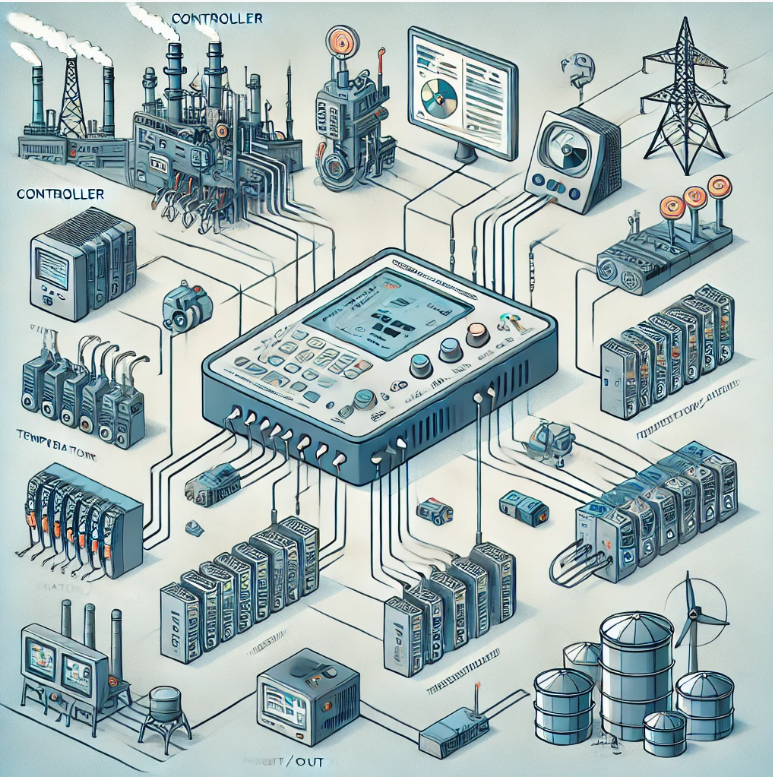DCS Components: Controllers and I/O Modules

Introduction
Controllers and Input/Output (I/O) modules are the heart of a Distributed Control System (DCS). They work together to process data from field devices and execute control actions, ensuring seamless automation and efficient management of industrial processes.
What is a Controller in DCS?
A Controller is a computing unit in a DCS that:
- Executes control logic to regulate processes.
- Processes input data from field devices.
- Sends output commands to actuators to adjust process parameters.
Controllers are distributed across the system for localized control, enhancing reliability and scalability. They are equipped with high-speed processors and communication capabilities to handle complex operations.
What are I/O Modules in DCS?
Input/Output (I/O) Modules serve as the interface between the controller and field devices. They:
- Input Modules:
- Receive signals from sensors (e.g., temperature, pressure, flow) and convert them into digital data.
- Output Modules:
- Send control commands from the controller to actuators like valves or motors.
I/O modules are typically modular and configurable, allowing flexibility in managing various field devices.
Role of Controllers and I/O Modules in DCS
- Data Acquisition:
- Sensors transmit raw data (e.g., temperature, flow rate) to input modules, which pass it to the controller for processing.
- Control Logic Execution:
- Controllers run algorithms (e.g., PID control) to analyze data and determine the necessary adjustments.
- Command Execution:
- Output modules relay the controller's commands to actuators, such as opening a valve or adjusting motor speed.
- Communication:
- Controllers and I/O modules communicate with other DCS components via high-speed networks, ensuring real-time data flow.
- Diagnostics and Alarms:
- Detect faults in field devices or communication links and alert operators.
Components of Controllers and I/O Modules
| Component | Function |
|---|---|
| Processor | Executes control algorithms and manages data processing. |
| Memory | Stores control logic and temporary data during operations. |
| Input Modules | Convert signals from sensors into digital format for processing. |
| Output Modules | Convert digital commands into signals for actuators. |
| Communication Ports | Enable data exchange with other controllers, I/O modules, and operator stations. |
| Redundant Modules | Provide backup in case of hardware failure, ensuring system reliability. |
Advantages of Controllers and I/O Modules
- Scalability:
- Modular design allows the addition of new I/O modules as the system grows.
- Localized Control:
- Distributed controllers reduce the load on central systems and enhance fault tolerance.
- Flexibility:
- Easily configured to handle a wide range of field devices and control scenarios.
- Real-Time Processing:
- Ensures immediate response to process changes or disturbances.
- Reliability:
- Redundant controllers and I/O modules prevent system downtime.
Applications of Controllers and I/O Modules
- Power Plants:
- Monitoring turbine parameters and controlling boiler operations.
- Oil & Gas:
- Managing pipeline pressures and refinery processes.
- Pharmaceuticals:
- Ensuring precise control in batch processes.
- Food & Beverage:
- Regulating pasteurization and packaging lines.
Challenges in Implementing Controllers and I/O Modules
- Integration:
- Ensuring compatibility with existing systems and protocols.
- Maintenance:
- Regular updates and calibration are required for optimal performance.
- Environmental Conditions:
- Must withstand harsh industrial environments like heat, moisture, and dust.
Controllers and I/O modules are vital components of a DCS, bridging the gap between field devices and operator stations. By executing control logic, processing data, and managing inputs/outputs, they ensure efficient and reliable industrial automation. Understanding their role and functionality is key to optimizing any DCS implementation.
